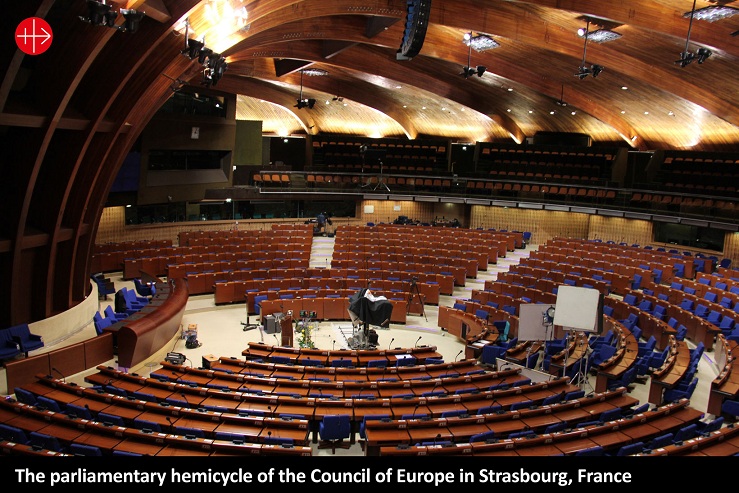UPDATE – voting decision
MEPs call for urgent action to protect religious minorities against ISIS
MEPs urge the international community to take urgent action to counter the systematic mass murder of religious minorities by the so-called Islamic State in Iraq and Syria (ISIS) or Daesh, in a resolution voted on Thursday. The text wraps up a 20 January debate with EU foreign policy chief Federica Mogherini, in which many MEPs called for measures to protect all religious and minority groups against ISIS attacks.
MEPs reiterate their strong condemnation of ISIS/Daesh and its egregious human rights abuses, deliberately targeting Christians, Yazidis, Turkmen, Shi’ites, Shabak, Sabeans, Kaka’e and Sunnis who do not agree with their interpretation of Islam. These violations amount to “war crimes”, “crimes against humanity” and “genocide” according to the Rome Statute of the International Criminal Court (ICC), they add.
The resolution, passed by show of hands, calls on the EU to establish a permanent Special Representative for Freedom of Religion and Belief and urges all countries in the international community to prevent war crimes, crimes against humanity and genocide within their territory. All EU member states should update their legal and jurisdictional systems in order to prevent their nationals and citizens travelling to join ISIS/Daesh and other terrorist organisations and also ensure that, should they do so, they face criminal court proceedings as soon as possible, adds the text.
European Parliament votes on a proposal to define ISIS persecutions in Syria and Iraq as genocide
The vote will take place on 4 February, and it will represent the first fundamental step towards ensuring that the international community takes action.
This week, on Thursday, 4 February the Plenary Assembly of the European Parliament will vote on a resolution to define the atrocities being committed by Daesh/ISIS in Syria and Iraq as “acts of genocide”, crimes against humanity and war crimes.
The resolution is the result of a debate that was held on 20 January, during which a large proportion of the European deputies qualified the extermination of religious minorities, and in particular the extermination of Christians and Yazidis in these countries, as genocide.
For its part, on 27 January, the Parliamentary Assembly of the Council of Europe adopted almost unanimously Resolution No. 2091 (2016) on “Foreign Combatants in Syria and Iraq”, in which it was recognised that “the individuals acting in the name of the terrorist organisation which calls itself Daesh … have perpetrated acts of genocide and other grave crimes punishable under international law and.”
The assembly also recalled “that under international law, states have a positive obligation to prevent genocide, that States should act on the assumption this is genocide and consequently they should do as much as possible to prevent their own citizens from taking part in such acts.”
The Swedish MEP Lars Adaktusson, who proposed this resolution in the European Parliament, has stated, “I am responsible for a resolution that calls on the member states of the EU to define the abuses against Christians and Yazidis as genocide, and in this way to act within the framework of the United Nations to develop the specific humanitarian and military interventions.”
On December 15 last year the Lithuanian Parliament approved a resolution regarding the genocide of Christians and other religious minorities in the Middle East and North Africa. Similar initiatives have been made in the US Congress.
Political leaders such as Hillary Clinton have used this term, which was already previously used by Pope Francis last July, when he asserted roundly that there exists “a genocide in progress, which must stop”. For him the moment has already come for the European Union and the United Nations to call this reality by its true name and to adhere consistently to the requirements of international law.
The implications
The “crime of genocide” has a precise definition in international law. It refers to crimes “committed with the intention of destroying, totally or partially a national, ethnic, racial or religious group”. Thus it is evident that the Christians and Yazidis in Iraq and Syria are victims of genocide.
International law imposes on states and on the international community the obligation to prevent genocide, to defend those groups that are the object of genocide and to convict and punish those responsible. Also punishable is the intent, complicity, conspiracy or incitement to commit genocide. Thus any individual or organisation, wherever it may exist – including in the European Union or the United States – which commits, intends to commit or is complicit in the act of genocide, or who incites to genocide, must be punished by the law.
The recognition of genocide is thus the first fundamental step for ensuring that the international community takes action. The use of the term genocide not only holds a powerful symbolic meaning, but in practice the international community must be ready to act when it faces an action that has formally been declared as genocide.
ACN Königstein






